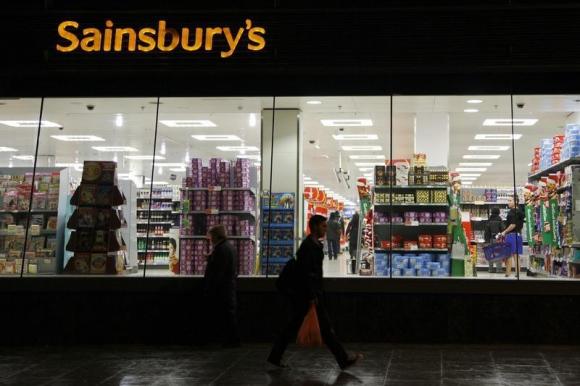 Sainsbury (SBRY.L) said it was well-equipped to cope with the rise of discounters and price cuts by major rivals, even though a 5.3 percent increase in annual profit represented its weakest growth in nearly a decade.
Sainsbury (SBRY.L) said it was well-equipped to cope with the rise of discounters and price cuts by major rivals, even though a 5.3 percent increase in annual profit represented its weakest growth in nearly a decade.Britain's grocery market is growing at its lowest rate for 11 years as price inflation slows and stagnant wages keep consumer spending in check.
The "big four" grocers - market leader Tesco (TSCO.L), Wal-Mart's (WMT.N) Asda, Sainsbury's and Morrisons (MRW.L) - are all being outpaced by sales growth at discounters Aldi ALDIEI.UL and Lidl LIDUK.UL. Upmarket chains Waitrose JLP.UL and Marks & Spencer (MKS.L) are also gaining share.
British consumers are shopping around to save money and are wasting less, shying away from big weekly shops and buying little and often in local convenience stores or online.
Tesco, Asda and Morrisons have been cutting prices to try to combat the discounters, with Morrisons firing the latest salvo last week with reductions averaging 17 percent on 1,200 products.
Analysts have expressed concern about a possible contagion of price cuts hitting margins and earnings across the industry.
"Ultimately whatever happens in the price skirmishes that we're currently seeing, we're a business that's very well-equipped to succeed in that environment," Sainsbury's Chief Executive Justin King told reporters.
"We'll do what we've always done, which is quietly focus on looking at the detail, the 15,000 prices we audit every week, making sure we stay competitive."
After 10 years at the helm, he will be succeeded by Mike Coupe, currently commercial director, following the firm's shareholders' meeting in July.
King said he was confident Sainsbury's offer set it apart from its rivals. It includes a focus on own-brand products, the "Brand Match" pricing scheme and the Nectar loyalty card, which along with continued investment in online and convenience - the fastest growth areas in the market - would allow it to outperform peers in 2014.
"The core issues in customers' minds go way beyond price," said King, highlighting Sainsbury's commitment in areas like sourcing more products from Britain, paying a fair price to dairy farmers and selling "cage-free" eggs.
He forecast underlying sales growth in 2014-15 similar to the 0.2 percent achieved in the 2013-14 year - far better than expectations for Tesco and Morrisons.
Sanford Bernstein analyst Bruno Monteyne said some consumers were willing to pay for what they considered better quality food.
"Sainsbury's offers this 'quality food for the masses' very successfully and the actions of Morrisons and Tesco moves them further away from the quality sector, further strengthening Sainsbury's differentiation."
CHANGING OF GUARD
Shares in Sainsbury's, down 15 percent over the last six months, rose up to 3.6 percent after the firm posted an underlying pretax profit of 798 million pounds ($1.36 billion) in the year to March 15 - ahead of analysts' average forecast of 782 million pounds and the 756 million pounds made in 2012-13.
Group sales, including VAT sales tax, rose 2.8 percent to 26.4 billion pounds.
Though Sainsbury's 16.8 percent market share is its highest for a decade, its nine-year run of quarterly sales growth came to an end in its fourth quarter when like-for-like sales fell 3.1 percent.
With analysts on average forecasting that Sainsbury's profit will fall to 762 million pounds in 2014-15, King denied he was getting out at the top.
"I'm retaining a significant shareholding in the company as an indication of my confidence in the future of the company ... The business can go from strength to strength," he said.
King was also confident that Sainsbury's would avoid the turmoil that management change has seen at firms such as Tesco.
He said his succession had been well planned over the longer term, Coupe had been instrumental in much of Sainsbury's success over the last 10 years and the firm's wider leadership team was very stable and experienced.
Coupe said: "Our strategy over the last 10 years has been incredibly consistent and it will be consistent in the future."





